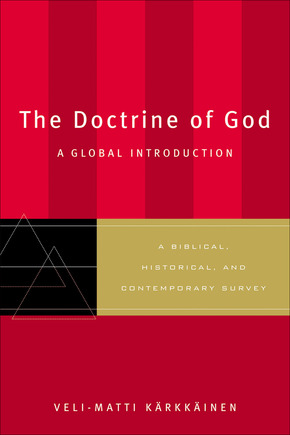Veli-Matti Karkkainen: The Doctrine of God
 Veli-Matti Kärkkäinen, The Doctrine of God: A Global Introduction. A Biblical, Historical, and Contemporary Survey (Grand Rapids: Baker Academic, 2004), 315 pages.
Veli-Matti Kärkkäinen, The Doctrine of God: A Global Introduction. A Biblical, Historical, and Contemporary Survey (Grand Rapids: Baker Academic, 2004), 315 pages.
The Doctrine of God is one in a series of books published in recent years by Veli-Matti Kärkkäinen, a Finnish-born theologian who currently teaches at Fuller Theological Seminary. As the subtitle suggests, the book intends to offers a survey of biblical, historical and contemporary approaches to the doctrine of God. This book brings to completion a three-part textbook series on God, Christ, and the Holy Spirit, all published by Baker Academic. Similar to the preceding volumes, this book is destined to become a standard textbook in many schools and seminaries. Teachers and scholars alike will benefit from this introductory text.
The book has two major purposes. First, to survey interpretations of God throughout Christian history and, second, to allow for a conversation between the classical theological tradition (“classical theism”) and its contemporary challengers. In order achieve this purpose, Kärkkäinen begins with an assessment of biblical texts concerning the doctrine of God. Following the biblical survey, he traces the development of classical theism from the early Church fathers to the beginning of the twentieth century. This main section of the book treats both European and North American theologians who significantly influenced the theological landscape. The final part of the book offers a condensed overview of contemporary interpretations of God outside the Western context, particularly African, Asian and Latin American voices.
Many readers will likely be most interested in the survey of contemporary theology. Kärkkäinen offers concise chapters on the work of Karl Barth, Paul Tillich, Karl Rahner, Wolfhart Pannenberg, Jürgen Moltmann and others. The section on North American texts addresses such challenging themes as process theology, the Death-of-God debate and open theism as well as African American, Native American and feminist theologies. Each chapter highlights the distinctive elements of these respective areas and introduces major theological voices. At the end of each section follows a short summary.
The Doctrine of God is a first-class introduction to the material every theology student should have in their library and an excellent overview of the texts for anyone who cannot afford to purchase those books. The overview of contemporary theologians represents the strongest part of the book. The chapters are concise, manageable and informative and offer a fine addition to many popular classroom collections.
Critique of the book will likely focus on the biblical and patristic sections. Kärkkäinen’s heavy and, at times, uncritical reliance on some authors, such as Walter Brueggeman and John Goldingay in the biblical section, as well as J. N. D. Kelly and Justo Gonzáles in the historical part, does not always offer the balanced view the author proposes. For example, the biblical section does not address aspects of Old Testament theology that speak of God as the one who destroys or the one who judges. Similarly, the patristic section speaks little about the often “unorthodox” view of some theologians even after the Council of Nicaea. Kärkkäinen seems more at home in contemporary European theologies, although treatment of Catholic authors could have included a number of other important theologians such as Yves Congar and Hans Urs von Balthasar.


